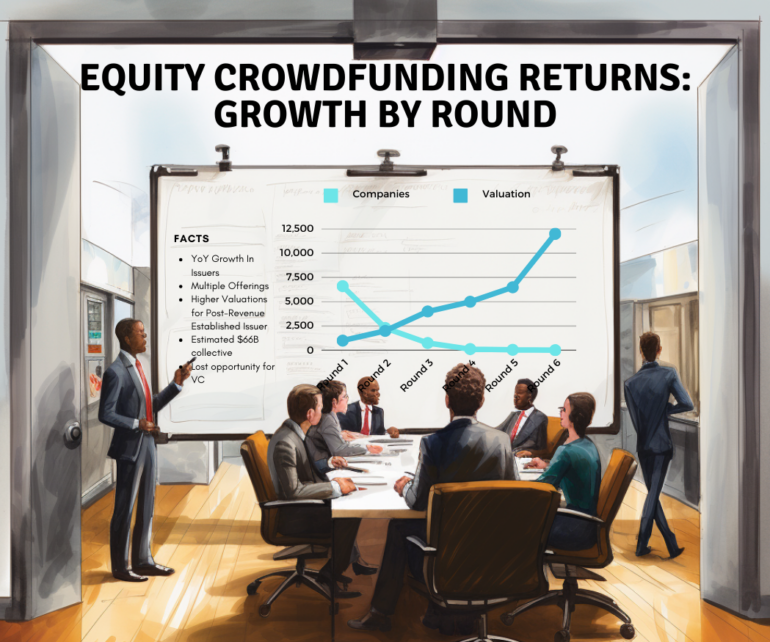After selling my venture-funded 3x Inc. 500 company to a private equity group, I sat down with two friends from Silicon Valley and decided it was time to tackle Goliath. My friends and I were fed up relying solely on Venture Capital to scale our businesses. So, we decided to carve out a new exemption allowing pre-IPO startups and small businesses to raise capital online from our friends, family, customers, and followers. We wrote a framework that would allow, for the first time in 80 years, the Average Joe to invest alongside accredited investors. People said what we did was ‘crazy’ and ‘would never happen.’ Well, after 460 days of self-lobbying and testimony on our part in front of US House and Senate panel hearings, we were invited to the White House for the 2012 JOBS Act bill signing ceremony and to see Investment Crowdfunding come to life.
Seven and a half years later, I can easily say that this widely bipartisan piece of legislation has not only lived up to its namesake as a ‘jobs engine’ but has transformed early-stage funding. Equity crowdfunding has stepped into the role of early-stage VC and done it systematically, not only creating generational wealth but doing so in a way that limits risk and standardizes disclosures. It took five years for the industry to top $1 billion in investments and less than two years to pass the second billion. The amount of capital that the ‘crowd’ is investing annually is nearly 50% of what Angels in the USA deploy, and it won’t be long before it eclipses that. Equity crowdfunding is quickly becoming the primary means of financing a pre-seed or an “Alpha” round.
The Positive Impact of the VC Pullback
Much of this progress can be attributed to the recent pullback by VCs in the market. When the floor fell from VC fundraising in Q3 2022, many startups had nowhere to look for capital. VCs were hoarding their cash to ensure their portfolio companies could stay afloat. This left startups with nowhere to turn except online. And that’s what we’ve seen thousands of them do with great success and benefits that these companies are saying they don’t get from their venture partners, like brand advocates who are out marketing these businesses in a way that venture can’t. But the benefits go far beyond this; according to our internal data, nearly 50% of all the issuers coming online have at least one woman or minority founder. Silicon Valley has never been able to successfully find or fund these entrepreneurs because they lack access to them.
And while the private capital markets are rife with fraud, there has been little evidence of it in Investment Crowdfunding. Why? Because Investment Crowdfunding is regulated, and all the information is public with a digital footprint to come after anyone who dares to commit fraud. There’s also vetting and diligence by regulated investment platforms and a community of potential investors asking issuers to defend their valuation, supply current quarterly results to compare against historical performance, and more.
Tracking Investor Sentiment
But the most amazing thing we have from the data that no one else in the private capital markets has is investor sentiment. Every day, we track how much money flows into hundreds of active offerings on over 80 investment platforms. We also track the number of checks written. With this information, we can see what deals are hot, what sectors investors are gravitating towards (or away from), and where the seeds of innovation are taking off in the country. Accurate data and investor sentiment set what we do apart from other major data providers. It may also be why you often see our name mentioned next to data insights in industry reports by the Securities and Exchange Commission (SEC), Bloomberg or the World Bank.
There have been multiple exits—even a few IPOs- out of the space. But much of the value is tied up still in these private companies that currently boast over $66B in economic value. This will be a media sensation when Average Joe’s start getting rich off their returns. Take, for example, Boxabl. They started their funding-raising journey online with a $42M valuation. Today, they have built manufacturing facilities to support selling their customizable dwelling units. They have yet to go public but have a $3.3B valuation as of their most recent round. A $25K investment in their first round would be worth over $2M today. With services from specialized providers that facilitate liquidity from Investment Crowdfunding securities, investors no longer need to wait for that IPO but can list their securities on a private exchange and have the opportunity to cash out when needed. Another fundamental shift in the private capital market.
The Next Facebook or Google
So, if you haven’t focused on it, maybe now is the time. The SEC recently increased the maximum these issuers can raise to $5M, and now we are pushing our JOBS Act friends in Congress to move that amount to $20M. We’ve seen a fundamental shift in the issuer profile. What used to be the majority of pre-revenue startups in the space has dwindled and been replaced by post-revenue established issuers. These issuers aren’t just running one round online but multiple. And because issuers have to file annual reports, we can track their financial or valuation progress. To say that the next Facebook or Google will begin their funding journey online is an understatement. The question is how investors allocate capital to this space to become future early-stage VCs.


